FROM JERUSALEM

COMFORTING ISRAEL IN TIMES OF WAR
(PAGES 12–16)
FEAST OF FIRSTFRUITS
The First and Best of What’s to Come
INTERNATIONAL CHRISTIAN EMBASSY JERUSALEM // APRIL 2024 // USA EDITION
•••
•••
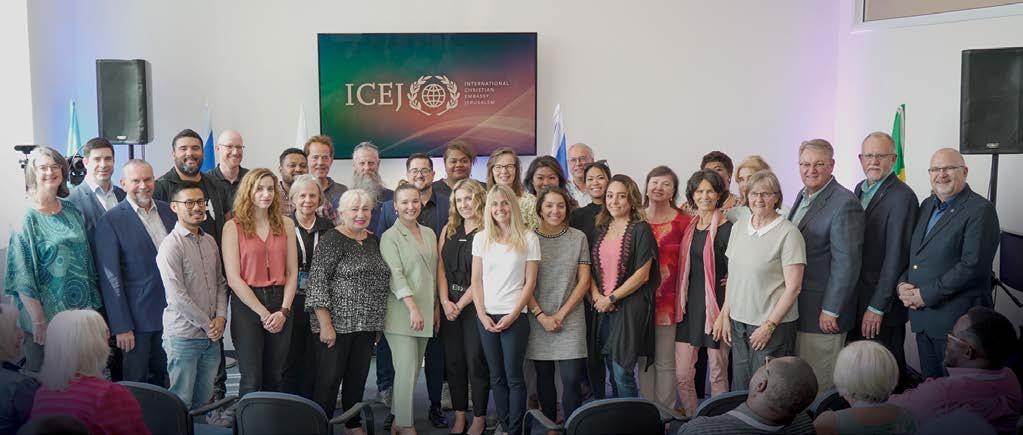

The International Christian Embassy Jerusalem was established in1980 in recognition of the biblical significance of all of Jerusalem and its unique connection to the Jewish people. Today the ICEJ represents millions of Christians, churches, and denominations to the nation and people of Israel. We recognize in the restoration of Israel the faithfulness of God to keep His ancient covenant with the Jewish people. Our main objectives are:
• To stand with Israel in support and friendship
• To equip and teach the worldwide church regarding God’s purposes with Israel and the nations of the Middle East
• To be an active voice of reconciliation between Jews, Christians, and Arabs, and to support the churches and congregations in the Holy Land
From its head offices in Jerusalem, the ICEJ reaches out into more than 170 countries worldwide, with branch offices in over 90 nations.
Our vision is:
• To reach every segment of Israel’s society with a Christian testimony of comfort and love
• To reach and actively represent to Israel the support of denominations, churches, and believers from every nation on Earth
The Christian Embassy is a non-denominational faith-based ministry supported by the voluntary contributions of our partners and friends across the globe. We invite you to join with us as we minister to Israel and the Jewish people worldwide by donating to the ongoing work and witness of the ICEJ.
FROM THE PRESIDENT'S DESK
Dear friends,
CREDITS
ICEJ President Dr. Juergen Buehler
USA Director Susan Michael
VP International Affairs Dr. Mojmir Kallus
VP Finance David van der Walt
VP Operations Barry R. Denison
VP International Spokesman David Parsons
VP AID & Aliyah Nicole Yoder
Managing Editor/Publications Director Laurina Driesse
USA Managing Editor Karen Engle
Staff Writer Anastasiya Gooding
Graphic Design/Illustrators Ryan Tsuen, Peter Ecenroad, Nancy Schimp
Photography Bill Fairs on Unsplash, Shutterstock,iStock, Adobe Stock, AP, AFP, JAFI, Flash90, Haaretz, Reuters, IDF, businessweek.com, Netafim, newatlas, SanDisk, Watergen, Waze, Wikimedia Commons, Levi Dörflinger, John Theodor, ICEJ Staff and Branches
The New King James Bible is used for all Bible references unless otherwise noted.
Word From Jerusalem is published by the International Christian Embassy Jerusalem. Reproduction in whole or in part without written permission is prohibited. Word From Jerusalem has no subscription price and is supported through contributions worldwide. The ICEJ USA Branch is a 501(c)(3) non-profit organization with offices in Tennessee, Florida, and Washington, DC. All gifts to this ministry are tax-deductible according to United States law.
INTERNATIONAL CHRISTIAN EMBASSY JERUSALEM - USA
Support our ministry online at: www.icejusa.org

By the time you receive this magazine, Israel will have been fighting Hamas for almost 200 days, and a possible northern front with Hezbollah might open soon. It’s Israel’s longest war since the War of Independence in 1948 in which 500 IDF soldiers lost their lives.
Israel did not want this war. On the contrary, our friend Ofir Libstein—who was the first named Israeli casualty on October 7—was spearheading an Israeli plan for a multibillion-dollar joint industrial park near the Erez Crossing that would employ some 10,000 Gazans in good-paying jobs. But this dream was shattered on October 7 when terrorists shot him down in front of his home.
At the same time, our faith in an Almighty God teaches us not to “cast away our confidence” and hope (Hebrews 10:35). Since October 7, we have prayed every day not just for Israel but also for the people of Gaza. Their only true hope is the gospel of Jesus Christ. As I write this, an opportunity may be emerging for us to start helping the small Christian community in Gaza. Please pray this open door will lead to an impactful opportunity for ministry on every level.
In the meantime, our Jerusalem staff is working tirelessly to stand with Israel as never before, as incredible doors are opening for us to bless Israel in this difficult hour. Whether helping evacuated Israelis and traumatized citizens, preparing the Haifa Home for a possible eruption of war in the north, providing more bomb shelters, donating ambulances to replace those destroyed on October 7, or simply coming alongside fearful Israelis to let them know they are not alone, we are here representing your love and support on the front lines of this conflict. You can read about some of these efforts on pages 12–16 of this month’s magazine.
Our mission remains unchanged. We seek to bring comfort to Israel at every level (Isaiah 40:1). We are pursuing every opportunity to fulfill this calling in the current crisis and impact the nation—whether senior government leaders or people in the streets of Jerusalem, Haifa, and the Gaza border area.
Yet we sense our most significant impact is through our prayers for Israel, which in some way God is answering daily. Please keep praying with us, and join our online Global Prayer Gathering (GPG) when possible—they are not only powerful times of prayer but briefings about the war to keep you abreast of the situation. We host them every day at 9:00 a.m. (EST) at on.icej.org/icejGlobalPrayer.
Please keep standing with us in this critical season. The Lord is opening unprecedented doors, but we need your help to go through them—so we can bless Israel like never before.

Many blessings from Jerusalem, Dr. Juergen Buehler President
International Christian Embassy Jerusalem
COVER PHOTO: A grain of barley—a “shadow” of the reality of Christ in the Feast of Firstfruits
FOR MAGAZINE ARCHIVES visit www.icejusa.org/wfj

INTERNATIONAL CHRISTIAN EMBASSY JERUSALEM // APRIL 2024 // USA EDITION FROM JERUSALEM COMFORTING ISRAEL IN TIMES OF WAR (PAGES 12–16) ••• FEAST OF FIRSTFRUITS The First and Best of What’s to Come
WORD FROM JERUSALEM
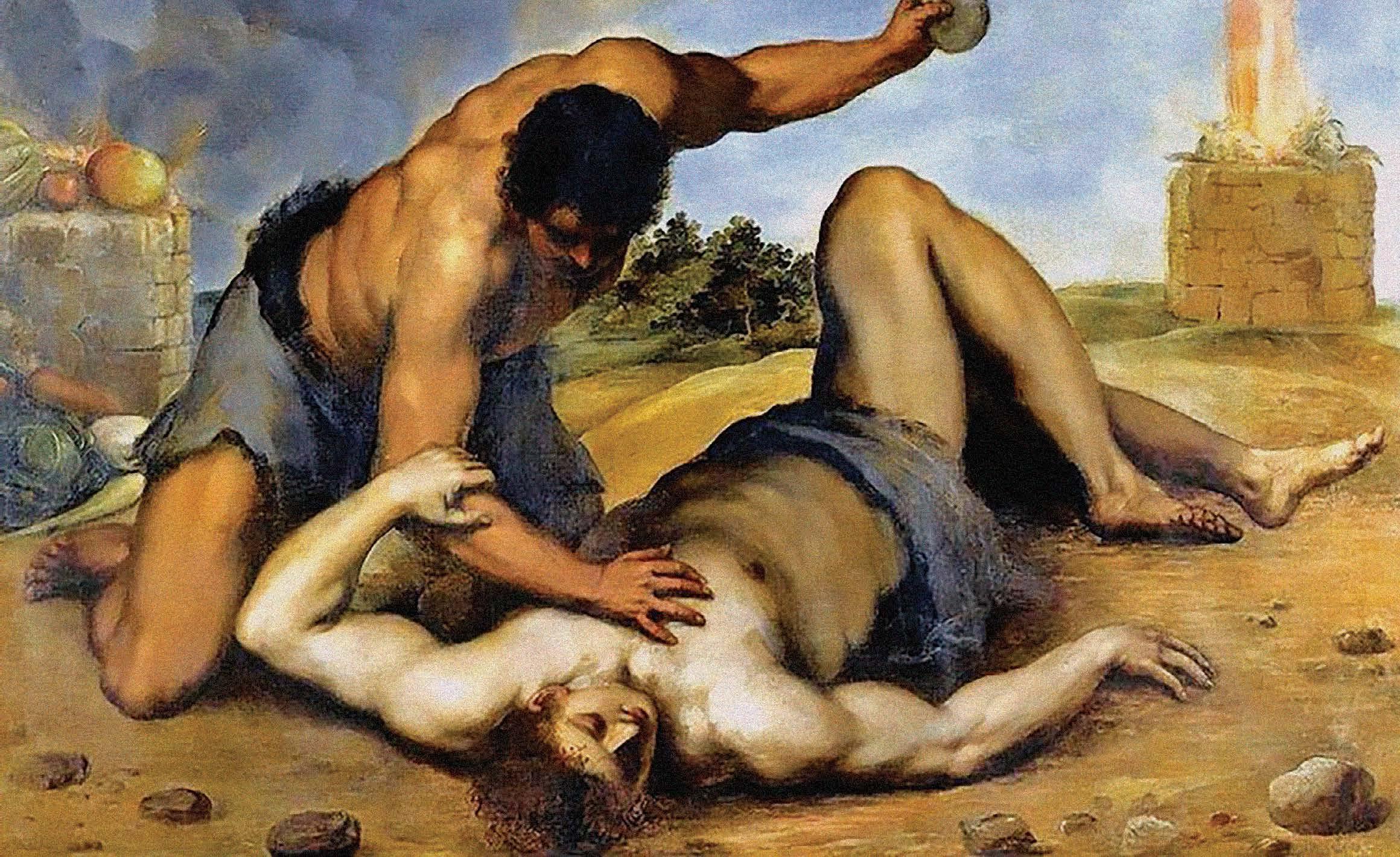
CAIN & ABEL AND THE BATTLE
12 ICEJ USA DONATES NEW AMBULANCE TO ISRAEL 4


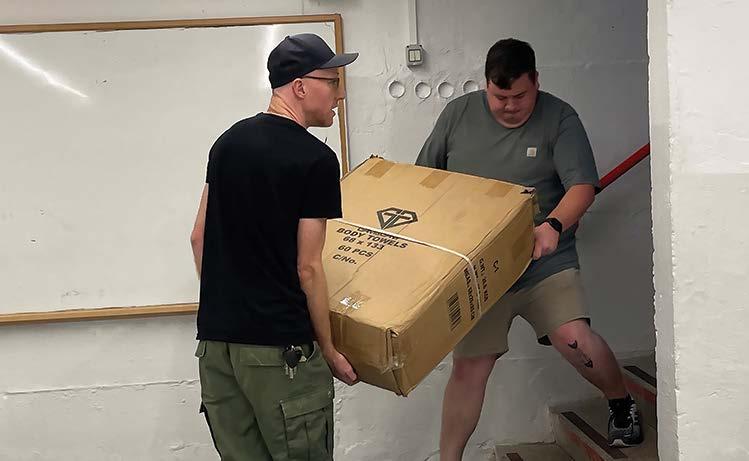
17 YOUNG ETHIOPIAN JEWISH IMMIGRANTS AIM HIGH

AGAINST
FEAST OF FIRSTFRUITS
ANTISEMITISM THE
6
14 APRIL 2024 USA EDITION FEATURED TEACHING HAIFA HOME PREPARES FOR WAR

CAIN & ABEL AND THE BATTLE AGAINST ANTISEMITISM
DAVID PARSONS, ICEJ VICE PRESIDENT & SENIOR SPOKESMAN
In the wake of the brutal Hamas massacre of 1,200 Israelis on October 7, it is incredibly chilling to see major world leaders spouting the most brazen antisemitic tropes even at weighty international forums.
At a recent hearing before the International Court of Justice (ICJ) in The Hague, representatives of South Africa insisted that Israel’s policies toward the Palestinians are “a more extreme form of apartheid” than what blacks suffered under the real apartheid regime. This comes on the heels of their earlier false accusation before the same Court that Israel is committing “genocide” in its war of selfdefense in Gaza.
United Nations official Francesca Albanese recently insisted that “the victims [of October 7] were not killed because of their Judaism but in response to Israel’s oppression.” Another senior UN official, Martin Griffiths, then decreed that “Hamas is not a terrorist group for us … It’s a political movement.”
To top it all off, Brazilian president Luiz
Inácio Lula da Silva told a press conference at a summit of the African Union in February that “what’s happening in the Gaza Strip isn’t a war—it’s a genocide. … It’s a war between a highly prepared army and women and children. What’s happening in the Gaza Strip with the Palestinian people hasn’t happened at any other

moment in history. Actually, it has happened: when Hitler decided to kill the Jews.”
T hough he faced some criticism over his outrageous antisemitic remarks, Lula da Silva also received backing from fellow leftist presidents in Bolivia and Colombia, who both
agreed that Lula was “only telling the truth.”
So here are professional UN bureaucrats and holders of high office who could only have achieved such positions of authority by maintaining self-discipline, and yet, they cannot seem to hold back from spewing hateful and odious statements against the Jewish nation and people.
How can we account for these outbursts of antisemitic and anti-Israel vitriol? Indeed, it is mystifying how antisemitism—the world’s oldest hatred—has persisted for so long and how it is drawing together radical Islamists and radical Marxists today.
EVER SINCE the Hamas terror militia carried out its savage pogrom last October, we have focused our attention and prayers on combatting the spirit of Amalek, which we have identified as the root cause of much antisemitism down through history and today is lurking behind the incessant Palestinian hatred and violence against the Jewish State of Israel. So, what is the spirit of Amalek?
4 | APRIL 2024
“Cain Slaying Abel” by Jacopo Palma, circa 1590
Luiz Inacio Lula da Silva (Photo: Ricardo Stuckert/ Brazilian presidency/AFP/ynetnews.com)
AMALEK was a grandson of Esau, who lost both his birthright and blessing as the firstborn to his younger twin brother, Jacob. And even though Esau eventually reconciled with Jacob (Genesis 33:4), his grandson, Amalek, never accepted the loss of his family’s inheritance. This burning envy later drove his Amalekite descendants to attack the Israelites at Rephidim (Exodus 17) and again under Saul (1 Samuel 15), at David’s camp at Ziklag (1 Samuel 30), and finally the exiled Jews of Persia through Haman in the book of Esther.
T his spirit of Amalek arose out of a classic case of sibling rivalry, which some philosophers have identified as the root cause of all violence. Indeed, sibling rivalries are a major theme throughout the book of Genesis. The Hebrew patriarch Abraham had two rival sons, Isaac and Ishmael; their mothers, Sarah and Hagar, also clashed. Tension was thick between Jacob and Esau and between Joseph and his eleven brothers, along with the dueling sisters Rachel and Leah. Yet, the biblical narrative indicates that in most cases, the brothers eventually reconciled, leaving us with a hopeful message that even sharp family divisions can be overcome.
But Amalek was an exception, which we see in the way all his later generations harbored festering jealousy and hatred of their Israelite cousins. The Bible even says: “The Lord will have war with Amalek from generation to generation” (Exodus 17:16).
T he first sibling rivalry, found in the book of Genesis, also ended in tragedy, when Cain slew his brother, Abel. This is a story short in the telling but rich in meaning, and ultimately, it is a lesson in why Hamas so viciously attacked Israelis on October 7.
IN GENESIS 4, we find that Adam and Eve birthed two sons. The older son, Cain, became a tiller of the ground, while the younger, Abel, was a shepherd. In due time, they both offered sacrifices to God. Cain presented an “offering of
the fruit of the ground” to the Lord, while Abel sacrificed “the firstborn of his flock and of their fat.” Scripture says, “The Lord respected Abel and his offering, but He did not respect Cain and his offering. And Cain was very angry, and his countenance fell” (Genesis 4:3–5).
Noticing Cain’s agitated state, the Lord approached him and warned Cain not to allow the burning envy toward his brother Abel to get the best of him: “If you do well, will you not be accepted? And if you do not do well, sin lies at the door. And its desire is for you, but you should rule over it” (Genesis 4:7).
T he message here is good advice for us about pleasing God and eschewing sin. There was no need for Cain to stay angry. He could have bartered some of his crops for a sheep and offered an acceptable blood sacrifice to the Lord, which is the only way to truly atone for sin (Hebrews 9:22). Cain should have already learned that lesson from his parents, who tried to cover their nakedness and shame with fig leaves before the Lord Himself shed the blood of an animal to make loincloths of animal skins for them (Genesis 3:7, 21).
T he Lord also cautioned that if Cain continued to stew in his anger, then sin (offense) was crouching around the corner, ready to pounce on him. The word “desires” in Genesis 4:7 in the original Hebrew means that sin “lusts” or “craves” for us, to trip us up and get us in trouble with God—so God is warning that it is best to get control of ourselves and resist temptation.
Cain failed the test, however, and allowed the fire of jealousy to arise within him to the point he murdered his own brother.
THE STORY of Cain and Abel is the first religious war in human history. Cain struck his brother dead because Abel had worshiped God in the right way and gained His attention and favor. Different religions believe they offer the right path to God. But the Lord revealed to the Jewish people His chosen path to right standing
before Him. The birthright and blessing to steward this incredible revelation went from Abraham to Isaac to Jacob and down to his 12 sons. This created jealousy along the way among other family members, who felt the inheritance should have been theirs, eventually giving rise to the violent legacy of the spirit of Amalek.
T his burning religious jealousy later attached itself to Christianity, producing generations of gentile believers who were convinced they had replaced Israel as God’s favored sons. The bitter legacy of Christian antisemitism haunts the church to this day. Yet thankfully, many Christians today have been freed from that spirit of envy and are confident in God’s election over us while also accepting His enduring, irrevocable election over Israel (Romans 11:29).
Sadly, the spirit of Amalek also attached itself to Islam from its inception, and today, it is producing radical Muslim terrorists around the world who are rising in jealous anger to eradicate the Jews instead of finding a better way to worship the one true God. To accomplish that end, they are willing to join hands with radical socialists and Marxists, even though most are avowed atheists.
Truthfully, Marxism has become its own religion, and it has sought to eradicate those with faith in God. The Communist revolutions and purges in Russia, China, and elsewhere tried to wipe out religious beliefs and forcefully impose atheism, murdering tens of millions along the way.
Somehow, radical Islamists and radical Marxists are now uniting around their antisemitic hatred and envy of the Jewish people. Rather than do the right thing, they would rather eliminate Abel. As Christians, we have a moral duty to confront this unholy alliance and defend the Jewish nation and people from its destructive agenda. This is a spiritual battle—and yet also one that must now be waged against weak and contemptible men who serve in high places and help run the world.

ICEJ COMMENTARY
THE FEAST OF FIRSTFRUITS
The First and Best of What’s to Come
KAREN ENGLE, ICEJ MANAGING EDITOR

The Lord said to Moses, “Speak to the Israelites and say to them: ‘When you enter the land I am going to give to you and you reap its harvest, bring to the priest a sheaf of the first grain you harvest. He is to wave the sheaf before the Lord so it will be accepted on your behalf; the priest is to wave it on the day after the Sabbath. On the day you wave the sheaf, you must sacrifice as a burnt offering to the Lord a lamb a year old without defect, together with its grain offering of two-tenths of an ephah of fine flour mixed with oil—an offering made to the Lord by fire, a pleasing aroma— and its drink offering of a fourth of a hin of wine. You must not eat any bread, or roasted new grain, until the very day you bring this offering to your God. This is to be a lasting ordinance for the generations to come, wherever you live’”.
—Leviticus 23:9–14
ICEJ FEATURED TEACHING
It was the day after the weekly Sabbath, what was biblically and in first-century Jerusalem “the first day of the week”—our Sunday. Jesus had already been in the tomb for a few days.
One of Jesus’ followers, Mary Magdalene, had come to the tomb while it was still dark and found the stone rolled away. She fetched the other disciples, and while they were looking in the tomb (only to find the linen cloths lying there without Jesus’ body), she saw a man she thought was the gardener.
But then the man called her by name: “Mary.”
Immediately she knew it was Jesus—alive! She reached out to Him out of compulsion, but Jesus’ response seems odd, even coded: “Do not cling to me, for I have not yet ascended to the Father” (John 20:17).
Theologians agree that interpreting the phrase “I have not yet ascended to the Father” is challenging. But read within the framework of the Feasts—specifically Firstfruits—it begins to become clearer. So let’s explore that unique and often overlooked Feast, or “appointment,” and see what we can learn, starting with what the Old Testament says.
God’s Instruction for Firstfruits in the Old Testament
Exodus 12 tells the story of Passover and how God spared every Hebrew firstborn whose home had the lamb’s blood over its doorposts and lintel. It’s the foundation story of the Jewish faith, how He brought Israel out of Egypt “with a mighty hand and an outstretched arm” (Psalm 136:2). Right after that first Passover, God next instructed His people to dedicate every firstborn child and animal to him—a theme that would carry through the entirety of the Bible.
However, it wasn’t until Mount Sinai that God formally established all the Feasts, starting with Passover and Unleavened bread followed by Firstfruits. Leviticus 23:9–14 and Deuteronomy 26 detail out this third feast on God’s calendar, where He explicitly instructs the children of Israel not to celebrate it until they are in the promised land.
Once in the land, before reaping their early grain harvest (barley), they were to take a sheaf (in Hebrew, omer, which means “a dry measure”) of the best of the first grain of that harvest to the priest who would present it as an offering at the tabernacle and later, the temple. The firstfruits sheaf represented the entire crop, and waving it up and down, left and right, was an act of thanking and acknowledging the Lord for the coming harvest and requesting His blessing upon it.
God commanded Israel to celebrate this feast on a particular day, “the day after the Sabbath”
following Passover on the first day of the week. Though Passover could occur on any day of the week, the first day of the week (according to biblical timekeeping) was always the day after the weekly Sabbath—which is Friday to Saturday, sundown to sundown. Thus, Firstfruits always occurred on a Sunday. God also said it was to be a statute forever.
The firstfruits offering, as well as the command to offer every firstborn male and animal to the Lord, was a continuation of an idea found early in Scripture: what is first and best belongs to God. God’s people were to give their first child or animal or barley sheaf to Him and trust Him to bless the rest. The children of Israel made their barley wave offering hoping that God would find it acceptable and extend His blessing for a later, abundant harvest.
Once they entered the promised land, the Jewish people started keeping the Feast of Firstfruits (in Hebrew, Yom HaBikkurim, or “Day of Firstfruits”) as instructed. By the time Jesus was born, though most Jews lived in Jerusalem, many were still scattered throughout the region, a result of Babylonian captivity hundreds of years prior. Because Passover was one of three festivals where God required all Jewish males to be in Jerusalem (see Deuteronomy 16:16–17), these Jews would travel from the nations to which they were scattered to be in Jerusalem as required. Undoubtedly, the week Jesus was crucified, Jerusalem was packed with people—I believe by God’s design—who had brought (or bought) lambs to be sacrificed for Passover.
God had set the stage before time began that the entire Jewish nation would be present to at least hear about Jesus’ death, if not witness it personally. And they would likely still be there a few days later over Firstfruits.
Firstfruits in the First Century
Only a week after Jesus had entered Jerusalem on a donkey and was hailed King and Savior, He was dead and in the tomb. Passover was over. The disciples were grieving. And the people and priests were preparing for the next Feast on God’s calendar: Firstfruits.
Before eating from their barley harvest, each Jewish family would bring their firstfruits offering to the priest. The Talmud gives us an idea of what this Feast was like in Jesus’ day while the First Temple was in use. The priest would meet Jewish pilgrims just outside the city and lead them up to the Temple Mount. They would take the sheaves of barley, lift some in the air, and wave them in every direction to acknowledge God’s provision and sovereignty and ask Him to bless the family’s whole harvest—just as in ancient times.
As they presented their offering, they recited Deuteronomy 26:3–10 that recounted their ancestor’s journey to and from Egypt, culminating with their arrival in the land of Israel, to remember and affirm their present reliance on God.
A Greater Harvest to Come
Recall that God specifically told the children of Israel they were not allowed to eat from their early barley harvest until the sheaf offering had been made and found acceptable to the Lord. Could it be that Jesus’ resurrected body needed to be presented before the Lord as an acceptable firstfruits offering before He could be touched? Was this why He told Mary not to cling to Him because He had “not yet ascended to the Father”? Quite possibly. (Consider that “doubting” Thomas was not restricted from touching Him a short time later.)
During Jesus’ last week on Earth, just before Passover, He said: “The time has come for the Son of Man to be glorified. Most assuredly, I say to you, unless a grain of wheat falls into the ground and dies, it remains alone; but if it dies, it produces much grain” (John 12:24). Indeed Jesus was the “grain” that had to die to “produce much grain.” Those who believe in Him are the “much grain” that will all physically die, too, but one day be raised like Him to new life.
This is why Paul could declare that Christ, risen from the dead, had become the “Firstborn from the dead” (Colossians 1:18; Revelation 1:5) and the “Firstborn among many brethren” (Romans 8:29). Speaking about the risen Christ, he said:
But now Christ is risen from the dead, and has become the firstfruits of those who have fallen asleep. For since by man came death, by Man [Jesus] also came the resurrection of the dead. For as in Adam all die, even so in Christ all shall be made alive. But each one in his own order: Christ the firstfruits, afterward those who are Christ’s at His coming. (1 Corinthians 15:20–23)
Here Paul links the Firstfruits wave offering with Jesus’ resurrection and recognizes there is an order to things: death comes before life.
The Feast of Firstfruits should receive our study and attention, for it points to a critical piece of God’s incredible plan of redemption. Jesus had to die so that many more might have life. And as the barley sheaves pointed to the promise of a greater harvest, so was Jesus’ resurrected life the first of a greater resurrection to come. He was the “forerunner” who entered heaven before us on our behalf (Hebrews 6:20) and found to be an acceptable offering, ensuring countless others could be resurrected to new life in Him and be forever in the presence of God.
7 | WORD FROM JERUSALEM
ICEJ FEATURED TEACHING


THE DEEPER SIGNIFICANCE OF SABBATH REST
KAREN ENGLE, ICEJ USA MANAGING EDITOR
There remains therefore a rest for the people of God. For he who has entered His rest has himself also ceased from his works as God did from His. (Hebrews 4:9–11)
Though Passover kicks off the Feast cycle each year and is among the most widely celebrated Jewish holidays today, God lists His instruction for keeping the weekly Sabbath before mentioning any of the feasts in Leviticus 23:
Six days shall work be done, but the seventh day is a Sabbath of solemn rest, a holy convocation. You shall do no work on it; it is the Sabbath of the Lord in all your dwellings. (v. 3)
Unlike God’s feasts, which He required Israel to observe once a year, the Sabbath was to be observed weekly—every Friday to Saturday, sundown to sundown. God instituted the Feasts at Mount Sinai, but the first time we see Sabbath appear in Scripture was before Adam and Eve sinned in Paradise. After six days of creating the sun, moon, stars, and all the earth, God blessed and made holy the seventh day as the Sabbath because “He rested from all His work” (Genesis 2:1–3). This is why God, through Moses, called Israel to “remember” the Sabbath day and keep it holy (“set apart”) in Exodus 20:8—for Israel, observing the Sabbath was an act of imitating their Creator who rested on the seventh day.
The word Sabbath means “to cease or desist,” and for the nation of Israel in ancient biblical times, this meant stopping labor once a week and trusting God for provision. Sabbath was to be an everlasting covenant and sign between Him and the children of Israel of their trust in and loyalty to Him and a significant practice that would set them apart from the surrounding, godless nations. The penalty for violating the Sabbath law was severe: death (Numbers 15:32–36).
Thus, it’s not by chance God listed Sabbath before the Feasts in Leviticus 23: the story of Israel is the story of God’s call to trust Him as King—one who would provide, protect, and care for them, though unseen. Trusting Him was paramount for what He required for all the Feasts.
Perhaps this is why some theologians say this weekly day of rest was even more sacred than the seven feasts: on other Sabbaths connected to Feasts, Israel had to refrain from “servile” work, like tilling the fields or cooking. But on the weekly Sabbath (and on the Day of Atonement), no work at all could be performed.
In addition to keeping the Sabbath because God modeled it by stopping work and resting on the seventh day after creation, the Bible gives another reason for observing Sabbath: to commemorate Passover when the Lord took the children of Israel out of Egypt with a strong hand and an outstretched arm (Deuteronomy 4:34; 5:15). Every Sabbath, Israel was to remember that God was her rescuer.
The Reality of Sabbath for Believers
The act of keeping Sabbath is more than stopping work once a week. That is only the shadow. The reality of Sabbath is the “rest” that comes from trusting and believing in Jesus as Savior. Jesus said, “Come to Me, all you who labor and are heavy laden, and I will give you rest” (Matthew 6:31; 11:28). Life as a believer in Jesus is not easy. We will at times find ourselves “heavy laden.” We will continually be pulled toward sin and tempted to trust ourselves and man instead of the One who promises to do the work for us.
The weekly Sabbath is a reminder of our need to continually rest in and trust in Jesus to not just do the work of redeeming us but sanctifying us—making us more like Him every day until He calls us home.
8 | APRIL 2024 8 | SEPTEMBER/OCTOBER 2020
8 | APRIL 2024 ICEJ FEATURED TEACHING
A
for your family, church, or Bible study group this year!
Celebrating Passover brings a deeper understanding of the exodus and its significance for Christians today. The ICEJ team can lead your group through all parts of the meal or assist you in hosting your own using our beautiful, new ICEJ Passover seder booklet that will walk you through every step.
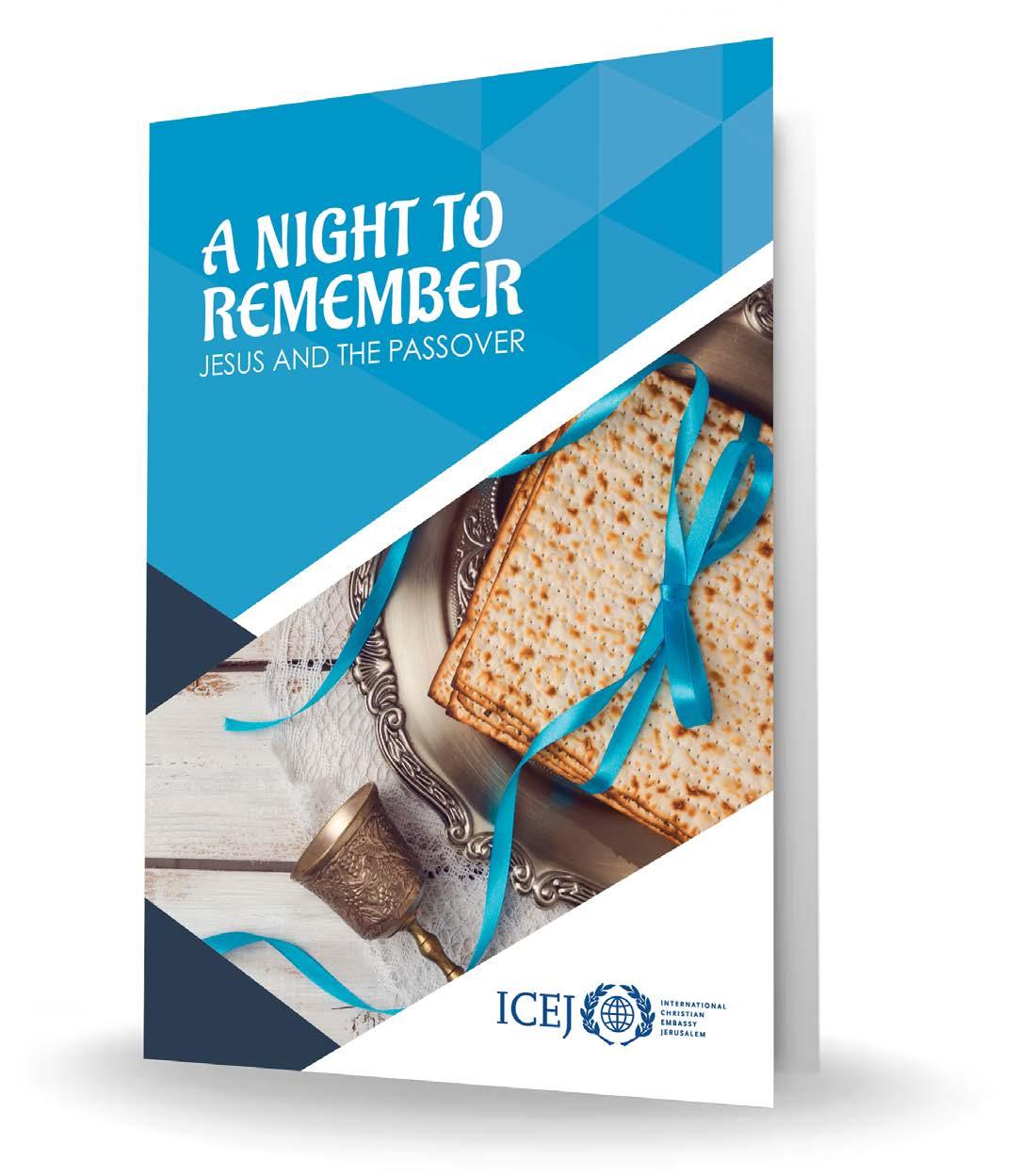
WWW.ICEJUSA.ORG/SEDER
ICEJ PRESIDENT HEADLINES ISRAEL BREAKFAST AT NRB
ICEJ President Dr. Juergen Buehler delivered the keynote address at the annual Israel Breakfast during the National Religious Broadcasters (NRB) convention held in February in Nashville, Tennessee. The ICEJ USA Branch cosponsored the traditional breakfast, which is the foremost pro-Israel event at the yearly gathering of Christian media and publishers from around the globe.
Dr. Buehler described how much Israel has changed since the shocking Hamas invasion of October 7, adding it also needs to be a “game changer” for Christians to stand with Israel as never before. Many Israelis have lost trust in the government and Israeli Defense Forces (IDF), he explained, and instead are turning toward their God in prayer. He added that the nation is more united to confront Palestinian terrorism, including those who once hoped in the peace process.
“You need to understand that the Gaza envelope communities are not the typical settler image of people with kippahs. They are very liberal, leftist people,” said Buehler. “One peace activist told me: ‘I don’t believe in peace anymore.’”
Dr. Buehler also expressed hope that Gaza could be transformed and steered away from hating Jews by allowing Evangelical Christians to be more involved in its rebuilding.

9 | WORD FROM JERUSALEM WATCH HERE: WWW.ICEJUSA.ORG/NRB2024 H
OST
PASSOVER SEDER
9 |WORD FROM JERUSALEM
ICEJ STAFF

THE KINGDOM OF GOD AND THE GAZA WAR
DR. GERALD MCDERMOTT
The kingdom of God is central for both Jews and Christians. The great Jewish philosopher Michael Wyschogrod taught that the number-one image for God in the Hebrew Bible is God as King. The same thing, you could say, is in the teachings of Jesus—that the kingdom of God is absolutely paramount. Jesus’ favorite teaching method was through parables, and the number-one theme of these parables was the kingdom of God.
Both Protestants and Catholics are tempted to misunderstand the kingdom. Protestants are tempted to think it is only internal and invisible, in the heart. Yet in the Gospels and Acts, the kingdom becomes quite visible. The Romans feared that the Jesus movement was an external threat. They knew that if the God of Israel is King, which the apostles preached, then Caesar was not. So the Romans persecuted the Jesus movement in visible ways.
The Catholic temptation is to think that the kingdom has already arrived in the church, and nothing more is to be expected. It’s all done. But if that is so, why did Jesus tell His disciples to keep repeating in the Lord’s Prayer, “Thy kingdom come!” as if it had not yet fully come?
The biblical message is that the kingdom is now because Jesus, as emissary of the kingdom, has come once. But He will come again to establish the kingdom more fully. So the kingdom is now and not yet. It’s both!
Now what about Israel? Jesus talks about the restoration of Israel in Acts 1:6 and elsewhere. More and more scholars are realizing that it’s not possible to understand Jesus’ view of the kingdom of God without understanding His expectation of Israel’s restoration.
In Luke 21 Jesus predicts that one day, Jerusalem will no longer be trampled upon by the gentiles, and this will begin the end of the Times of the Gentiles. “Trample upon” is a technical term for political and military control. That occurred when Israeli paratroopers seized East Jerusalem in 1967.
We must first understand that both the Hebrew Bible and Jesus teach that God deals
with nations as nations, not just individuals. Second, God judges the nations by how they treat the Jewish people and Israel. And third, toward the end of days, the nations will turn against Israel and her people. Scripture also suggests that Israel’s restoration is part of the firstfruits of the healing of the nations, specifically mentioned at the end of the book of Revelation as part of the future.
So, what about Israel’s war with Hamas? We should not be shocked by the savagery and evil of Hamas. What we saw on October 7 was a full-color video of Satan’s hatred for God’s chosen people, the Jews.
Would Jesus support the Gaza war? Many Christians from the pacifist tradition, the Anabaptist tradition, would say no, that He was against all bloodshed and killing. I disagree. I respect them, but I would say that Jesus tells us to love our enemies and hate the evil they represent.
Jesus was a Jew, and the Hebrew Bible, whose every letter Jesus inspired, teaches that the
Jesus shows His hatred for evil in the parable of the wicked tenants. He tells us the vineyard owner punished the wicked tenants who killed his servants and son by, as the text puts it, “putting those wretches to a miserable death.” Those are inspired words describing a bloody punishment of wicked men.
In Revelation 19 Jesus’ robe drips with blood, and out of His mouth comes a sword for killing the wicked. This is the same Jesus whom many Christians think is only mild and meek. But the true Jesus is also holy and punishes wickedness.
The point? While Jesus calls us to love our enemies, His love is holy. That’s very different from the world’s love, which is typically unholy. His call for us to love our enemies does not contradict the tragic need for nations— particularly the nation of God’s chosen people, the Jews—to defend themselves against those who seek their elimination.
We Christians must recognize that Iran and Hamas say quite openly that they are coming

fear of the Lord is the hatred of evil. Paul quotes that in Romans 12:9. Jesus Himself hated evil. In Revelation 2:6, Jesus praises the church of Ephesus for hating the works of the Nicolaitans, “which I also hate.”
Jesus is not a pacifist. He believed, as all Jews believe, that there is a time for war, as Ecclesiastes 3 teaches.
after Christians next. Israel today is fighting for civilization and righteousness. We must do what we can to support them—spiritually, politically, and militarily.
10 | APRIL 2024
Dr. Gerald McDermott speaks about Israel’s war with Hamas and whether Jesus would support it at Envision 2024.
Dr. Gerald McDermott is an Anglican theologian and a leading scholar on Christian Zionism. This message is excerpted with minor edits from his presentation at the ICEJ’s Envision Conference 2024.
ICEJ 2024 ENVISION CONFERENCE
TGLOBAL PRAYER GATHERING, ROSH CHODESH OFFER PREVAILING PRAYER FOR ISRAEL
JOSHUA GOODING, ICEJ PRAYER DEPARTMENT HEAD
he nation of Israel is not only at war against the Hamas terror militia but also against dark spiritual forces that seek to hinder Israel from reaching its destiny in God.
Following the brutal massacres on October 7, Israel declared war on Hamas. The ICEJ also joined the battle through prayer, wrestling with principalities, powers, and rulers of darkness in heavenly places (Ephesians 6:12). Over 10,000 intercessors from 173 different nations have joined our online Global Prayer Gathering (GPG) since October 7—averaging over 1,000 participants each day.
Through these faithful prayer warriors, the worldwide ministry of the ICEJ has been greatly strengthened and encouraged. The Lord also has given us much wisdom, revelation, and discernment on how to pray into this war. Participants are sending us testimonies about how the daily GPG sessions have lifted them from despair over the conflict and intensified their intimacy with God.
“We highly value and love the maturity of the panel and many of the intercessory groups. We share and delight in the love that the ICEJ has for God and for the Israeli people,” one attendee recently wrote.
At the start of the war, the ICEJ’s parallel Rosh Chodesh prayer chain was covering two weeks of prayer each month, as groups from different nations took up the baton of engaging in round-the-clock prayer for an outpouring of the Holy Spirit on Israel and for revival in their nations. As we continued to intercede, we noticed that many churches and prayer groups already
participating in the Rosh Chodesh online vigil took on added hours. As a result, the Rosh Chodesh prayer chain has now been going 24/7 since January 11
From the beginning of the war, the Lord made clear that we are battling the spirit of Amalek. The Bible describes this as a spirit of envy that arises in every generation to try to annihilate the Jewish people—especially when they are on the brink of a spiritual breakthrough for the nation.
During the time of Moses, the Amalekites traveled a great distance to attack the children of Israel just before they reached Mount
Amalekite prince, Haman, arose to destroy the Jewish people just before their return to the land of Israel to rebuild the temple in Jerusalem.
These three stories reveal three keys to victory over the spirit of Amalek. The first is found in the books of Moses, as Amalek was defeated by Joshua as Aaron and Hur came alongside Moses and held up his hands in intercession. This is a picture of our agreement in corporate prayer, coming together as a body to lift the Jewish nation as they engage in battle.
We find the next key in the story of David, who had to strengthen himself in the Lord before engaging the Amalekite marauders in battle. Before we lead our churches and communities to stand in prevailing prayer for Israel’s victory, we ensure we are standing strong and upright in the Lord ourselves.

The final key the Lord has revealed is that some breakthroughs can only be achieved through prayer and fasting, as was the case in the story of Esther. Corporate fasting and prayer brought a complete turnaround and unraveled the evil plans hatched by the spirit of Amalek.
The brutal attacks on October 7 have shown that this spirit has raised its head once again to try and stop Israel from reaching its destiny. We believe this is because the Lord is getting ready to release something great in the earth through the Jewish people and nation once more. As intercessors and watchmen called from across the nations to stand on the walls of Jerusalem, let us take our place and strategically pray for Israel during this critical time.
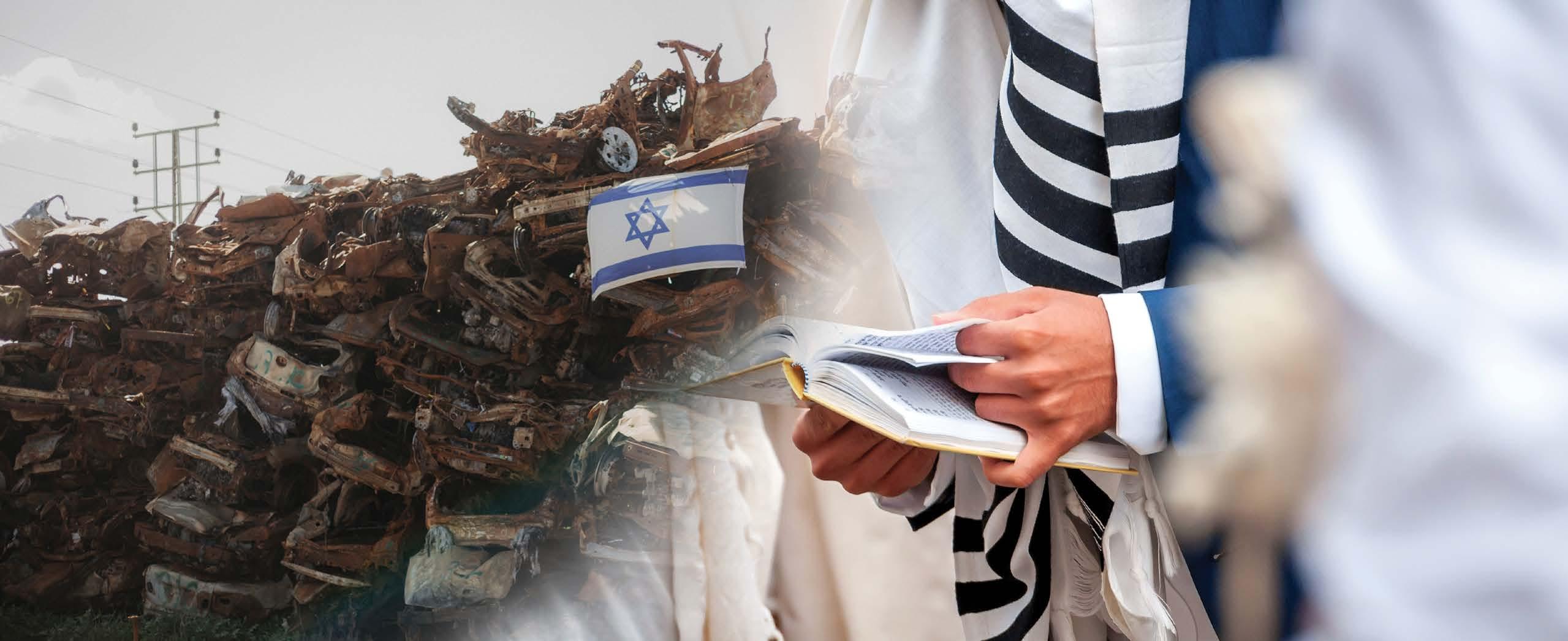
Join our daily Global Prayer Gathering starting at 9:00 a.m. (EST) at: on.icej.org/icejGlobalPrayer Join the USA Rosh Chodesh prayer wave every Wednesday from 3:00–4:00 p.m. (EST) at: www.icejusa.org/roshchodesh ICEJ PRAYER UPDATE


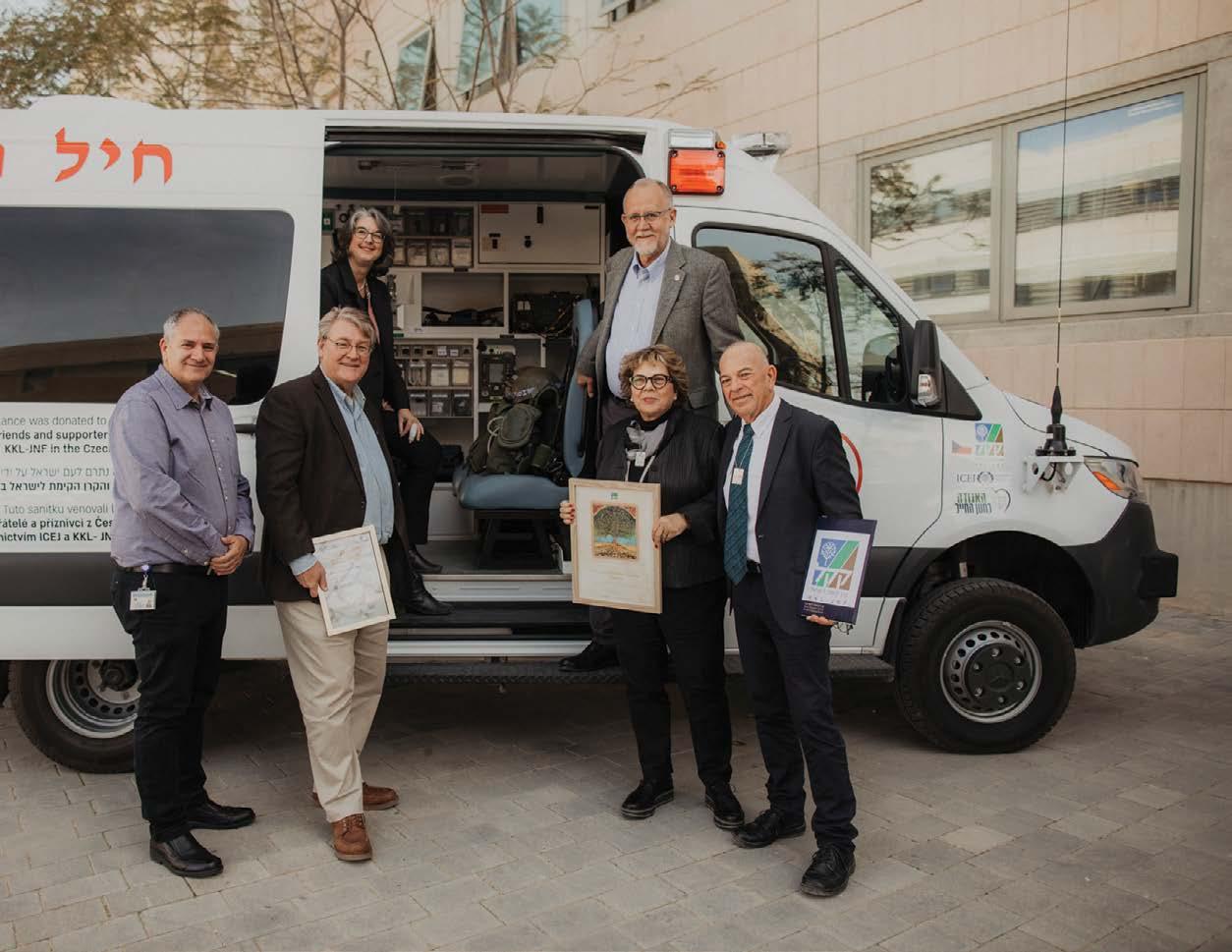
ICEJ USA DONATES NEW AMBULANCE TO ISRAEL
DAVID PARSONS, ICEJ VP & SENIOR SPOKESMAN
The International Christian Embassy Jerusalem has responded to Israel’s current war crisis with numerous urgent relief and aid projects, including the donation of four new ambulances to help replace the dozens of Israeli ambulances destroyed during and since the Hamas massacres of October 7.
The donated ambulances include an advanced, fully equipped military ambulance to serve Israeli communities near the Gaza border, two ambulances for the nationwide fleet of Magen David Adom, and a special ambulance to serve elderly Holocaust Survivors in Haifa and northern Israel.
The military ambulance was dedicated in a special ceremony at an IDF medical training base near Be’er Sheva in January. The Czech branches of the ICEJ and Jewish National Fund jointly raised the funds for the ambulance to serve the residents of Kibbutz Be’eri and the Eshkol Region, which were hit hard during the Hamas terror invasion. Over 110 members of Kibbutz Be’eri, including two paramedics, were murdered in the horrific terrorist attack, and 23 were taken hostage into Gaza.
Kibbutz Be’eri was chosen as a beneficiary because its story reminded many Czechs of the brutal Nazi destruction of the village of Lidice in 1942. The initiative also arose from video footage of Hamas gunmen shooting up an ambulance during their rampage through Be’eri.
In the meantime, Christian supporters of Israel in Switzerland and the United States have funded the purchase of two fully equipped ambulances through Magen David Adom.
The ICEJ donated a fourth ambulance to serve Holocaust Survivors in northern Israel, including the residents of its unique retirement home for needy Holocaust Survivors in Haifa. The ambulance will be operated by the ICEJ’s local charitable partner Yad Ezer L’Haver.
Besides these four new ambulances, the ICEJ has recently donated:
• 1 new Medi-scooter to Magen David Adom
• 4 medical packs and 4 defibrillators for security officers in Hof Ashkelon
• 5 new fire-fighting ATVs for communities in the western Negev
• 400+ sets of special radio transmitters for security and first responder teams in communities along the Gaza border
• Hundreds of helmets and protective vests for first-responder teams
• 12 new portable bomb shelters, along with the renovation of 140 existing underground shelters in northern Israel
“We have a deep attachment to the nation and people of Israel and are firmly committed to helping them overcome the many challenges of this war so they can rebuild their lives and restore their sense of security,” said ICEJ President Dr. Juergen Beuhler.
12 | APRIL 2024 Help provide other urgent needs for Israelis impacted by the war at: www.icejusa.org/crisis
Ambulance donated to serve Holocaust Survivors in Haifa and northern Israel (ICEJ photo)
ICEJ and Jewish National Fund (JNF) officials dedicate a new military ambulance for Israeli communities in the Gaza border area. (ICEJ photo)
ICEJ AID

HELPING A HERO’S FAMILY RECOVER IN SDEROT
NATIVIA SAMUELSEN, ICEJ AID ADMINISTRATOR
Early in the morning last October 7, alarms blared across Sderot as Hamas terrorists from nearby Gaza invaded the city. As chaos engulfed the town, local policeman Eli* and his fellow officers confronted dozens of militiamen, stopping their advance. Their quick response and courage saved hundreds of Israeli lives. Nevertheless, Eli was tragically killed, leaving behind a wife and children. In total, at least 70 security personnel and civilians died in the battle for Sderot.
His death left Eli’s wife and children with unimaginable grief, but the family was also stuck in a home in need of significant repairs. The roof leaked, the electrical system was unsafe, and the kitchen and bathroom were run down. Eli had been working on renovations before the attack that he would never finish.
Today, however, the house is being fixed and upgraded to create a warmer, brighter home for the remaining family to rebuild their lives. When the ICEJ learned of Eli’s bravery and sacrifice and his grieving family’s dilapidated home, we responded by helping complete the
repairs. We are working with local Israeli handymen to finish what Eli started, to help ease the family’s recovery.
“I feel so small compared to the huge loss of this family,” said Gabi Nachmani, one of the repairmen. “This is the least I can do for them.”
The ICEJ has assisted many other Sderot families evacuated to safer places in Israel, including with voucher gift cards to shop for food and essential items at local supermarkets.
Please join us in meeting the urgent needs of Israelis still reeling from the current war.
*Name changed to protect family’s privacy.
Donate to our Israel in Crisis fund at: www.icejusa.org/crisis
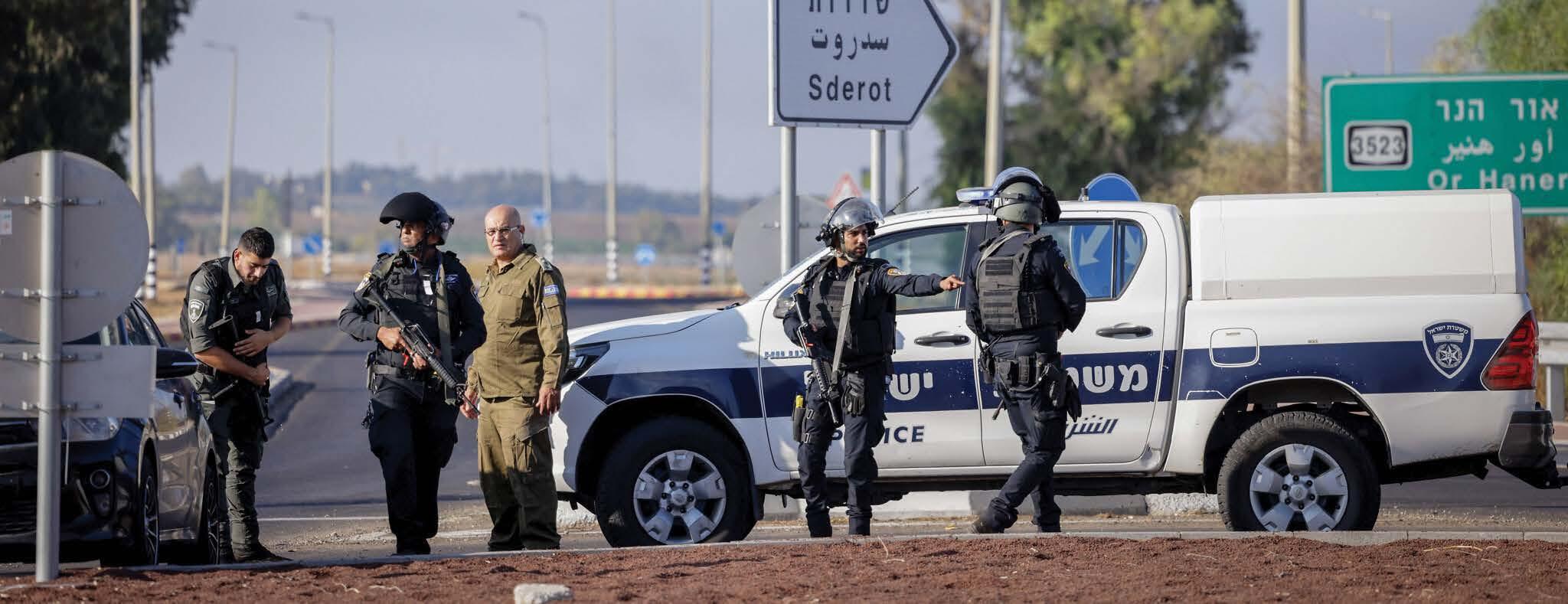
13 |WORD FROM JERUSALEM
ICEJ AID
A volunteer fixes the bedroom ceiling for the family of a slain policeman.
Israeli police retake Sderot after the October 7 Hamas invasion.

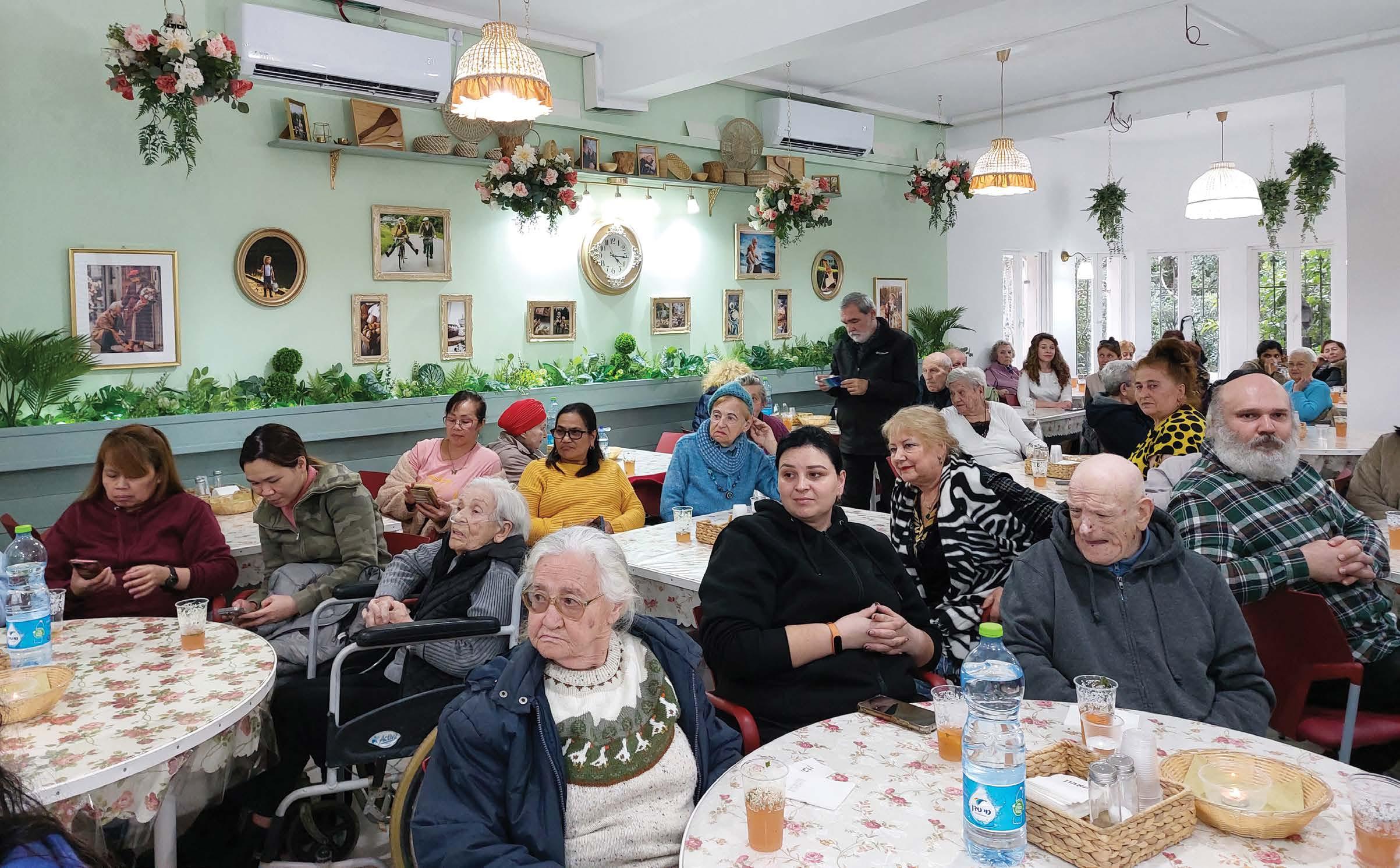
HAIFA HOME PREPARES FOR WAR, RENOVATES DINING ROOM
YUDIT SETZ, ICEJ DEPUTY AID DIRECTOR
Among the many activities of late at the ICEJ’s Home for Holocaust Survivors in Haifa—including renovations, birthday celebrations, and more—we have also worked to safeguard the residents in case the current war in Gaza escalates to the point of engulfing northern Israel in a major conflict with Hezbollah in Lebanon.
Preparing for the Possibility of War
Israeli leaders have warned that tens of thousands of Israelis evacuated from communities along the northern border may not be able to safely return to their homes unless the IDF goes into southern Lebanon to push the Hezbollah terror militia back from the border area. This would likely lead to a major escalation in the current war, with several thousand Hezbollah rockets fired into northern Israel every day.
In response, the ICEJ has taken several steps to better prepare our Haifa Home to protect the elderly Holocaust Survivors who reside there. First, we have arranged with the city of Haifa and the electric company to provide a large backup generator that can supply power for the entire block where most of the residents live in case of a power failure. We have organized a large safe room off the dining hall to allow quick access during meals and community meetings. We have also purchased and stored away food and emergency items to take care of the residents if no one can go outside.
In addition, we have placed a bomb shelter near the main gathering place at the Home and equipped a large underground shelter at a public school across the street to house the residents should Haifa come under heavy rocket barrages. Finally, we have donated a new ambulance to serve Holocaust Survivors at the Home and other Survivors throughout the Haifa region.

We pray that the conflict will not widen, as the residents of the Haifa Home have already seen enough wars and suffering in their lives. But we must be prepared, just in case.
14 | APRIL 2024
ICEJ HAIFA HOME
A Haifa Home bomb shelter that is being better equipped in case of war in the North


Remembering Moshe Bar Haim
Moshe Bar Haim, a resident of the Haifa Home, was born in Romania and lived happily with his family as a child. But his life drastically changed during World War II when the family was forced into hiding. After a long time of fear of getting caught, the Jewish family was finally discovered by German forces, who separated them and sent them to different camps. There Moshe witnessed unimaginable horrors and faced traumas, hardships, and heartache that would mark him for life.
Miraculously, the family survived the war and was liberated by the Russian army, and Moshe soon sailed for Mandatory Palestine. But on the way, the ship was stopped by British forces, and Moshe was brought to Cyprus, where he and other Jewish war refugees were put into detention camps yet again. Eventually, Moshe arrived in Israel, where he studied agriculture, was drafted as a soldier, and ultimately became a teacher. He then moved to America, where he discovered his talent as a chef and restaurateur, running a thriving restaurant with his wife.
Sadly, Moshe’s life was once again touched by grief when he lost his wife after 46 years, followed later by the loss of his youngest daughter. In his later years, back in Israel, Moshe needed a supportive environment, which he found at the Haifa Home until he passed on January 30, 2024, at the age of 90. His departure has left a void among his family and friends and the entire community at the Haifa Home.
Yaacov Celebrates 100th Birthday
Haifa Home resident Yaacov H. just reached the remarkable age of 100, joining two other centenarians with Polish roots at the Home! The dedicated care of our amazing 24/7 caregivers and the activities and love offered at the Home all contribute to the longevity of our residents. The Haifa Home continues to be a place of warmth and joy that inspires our residents and team. Thank you for allowing us to celebrate these milestones with these precious Holocaust Survivors!

Home more beautiful, homey, and inviting for our residents. So we embarked on a major renovation of the community dining hall, which involved modernizing the kitchen and adding a special corner for all the dairy products—plus an industrial dishwasher.
The renovation plans were done by an interior designer from the Caucasus region named Maya, who made Aliyah last year. She is an engineer, but interior design is in her heart. For us to give a new Jewish immigrant their first project in the country was an added blessing in this renovation.
“This is my first project in Israel. I put my heart and soul into it to bring some joy to the Holocaust Survivors, who suffered so much,” said Maya. “I hope that when they enter the room, it will give them a warm and joyful feeling and add some positive things in their life.” Maya is joyful and energetic, and she gave her whole self to the project, putting in long hours alongside the local construction workers.
Then, after a month of tough work by a carefully selected group of wonderful professional builders, we finally hosted a festive and joyous reopening in mid-February. The residents beamed with joy! The dining room is not just where residents enjoy their daily meals, but it provides a feeling of community. There, residents enjoy a sense of belonging as they gather to see one another, talk—and so much more. It also is where most of the main community gatherings, such as concerts and group visits, are held.

With beautiful music from a violin and pan flute, delicious delicacies, and a festive meal, the dining hall was officially reopened. The room was packed! Most residents and their caregivers who came were delighted to be together and enjoy the new look and feel.
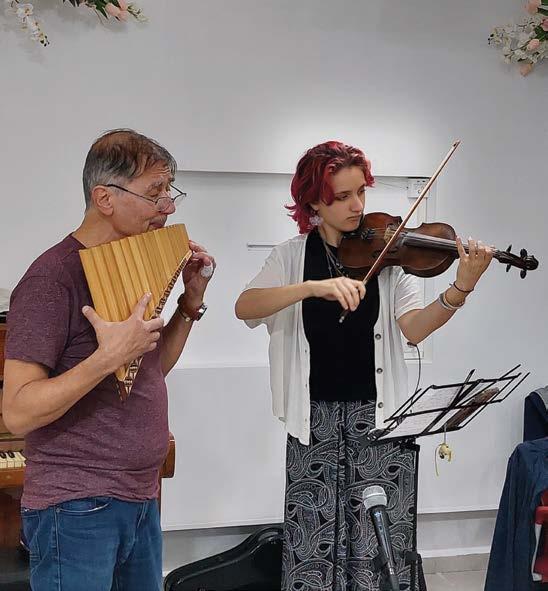
Renovated Dining Room Reopens
We are always keen to make the shared public spaces at our Haifa

“Wow, it is so beautiful and homey! It is like sitting in a very nice restaurant,” said one resident, and many others agreed. They were also eager to thank all their generous Christian friends worldwide who made this revamped dining hall possible.
Please continue to support the Haifa
and the ICEJ’s other efforts to care for the needs of aging Holocaust Survivors in Israel.
Home
Donate to the Haifa Home at: www.icejusa.org/holocaust-survivors
15 |WORD FROM JERUSALEM
ICEJ logistics team preparing the shelter
The new Haifa Home backup generator
ICEJ HAIFA HOME

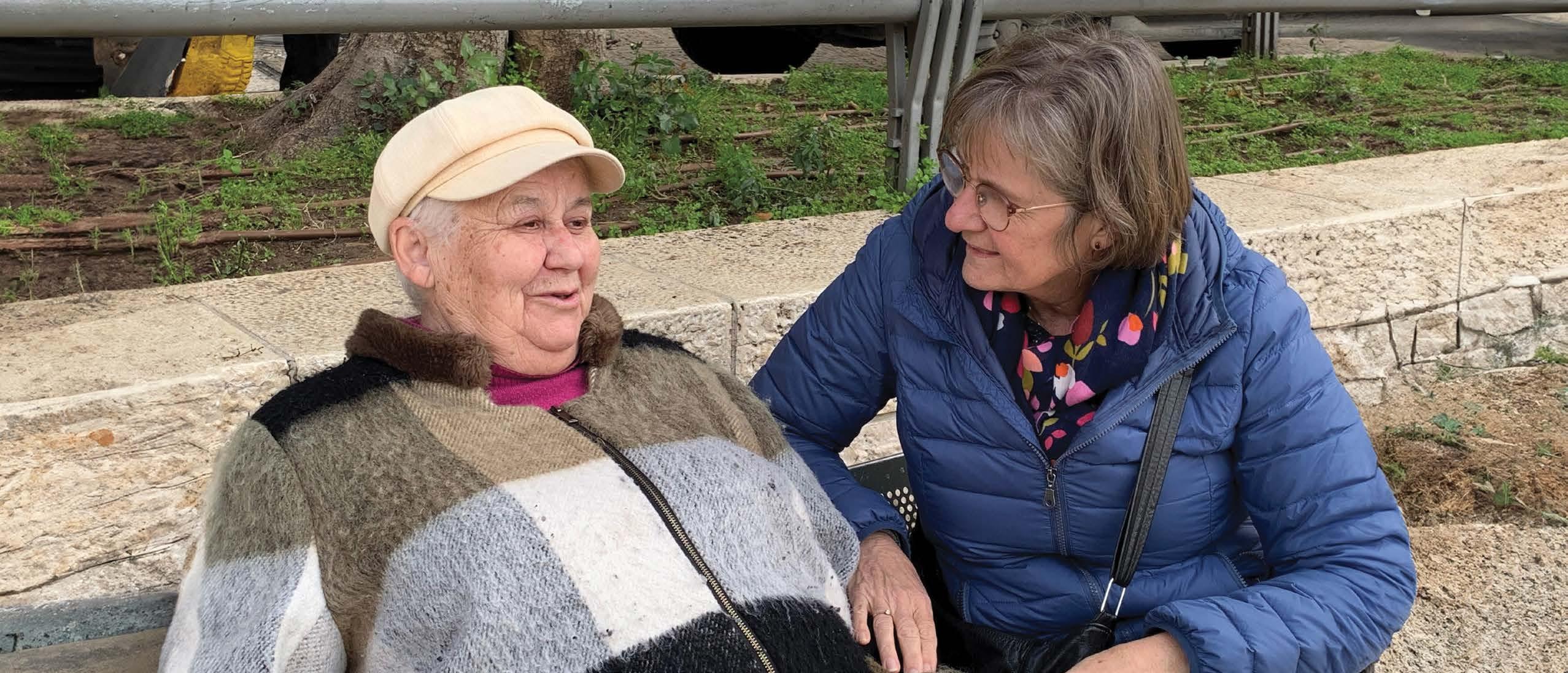
A GRANDMOTHER’S WISDOM DURING WARTIME
MAXINE CARLILL, ICEJ AID
“Thus says the Lord of hosts: ‘Old men and old women shall again sit in the streets of Jerusalem, each one with his staff in his hand because of great age. The streets of the city shall be full of boys and girls playing in its streets.’” (Zechariah
8:4–5)
The above prophetic word, written 500 years before the Jesus walked the earth, is being fulfilled in our days.
Tanya—a grandmother among those of a “ripe old age”—is one who sits in the streets of Jerusalem. Recently, she left her modest apartment in the Old City and sat with Corrie van Maanen of ICEJ Homecare near the restored Hurva Synagogue in the Jewish Quarter. She was eager to share her thoughts, especially about the current tensions.
“War is scary, wherever it is, but still, there is a sense of calm in Israel,” she said. “I do not know where it comes from. Even though there is a lot of anxiety and questions on when the war will end, there is still a sense of security. … I feel the Almighty protects us. I feel protected.
“The first days after October 7, I was very afraid, even to go outside,” explained Tanya. “I just listened constantly to the news. And then, slowly, I started to go outside. I took a chair and sat near the entrance … and started to get used to everything.”
Tanya never studied Hebrew when she made Aliyah years ago, since she had to care for her sick, elderly parents. Then, her husband grew sick and later died. Thus, Tanya feels torn between the place where she was born in Ukraine and where she has now lives. Her heart goes out to many friends suffering
in the Ukraine war, as she follows the war through Russian language channels. But her heart is also pulled toward what’s happening in Israel: “I feel heavy when I hear the bad news of young Israeli soldiers dying. It makes you want to cry,” she told Corrie. Tanya is no stranger to war. Her father fought in the Second World War and miraculously survived a burning tank three times. She was born in the difficult days of Stalin’s rule. As she recounted her life story, Tanya suddenly turned to Corrie and exclaimed: “Do you remember how we met you from the ICEJ? My mother really needed help, and I was given your phone number, and we called you. We were always glad to have your help and friendship.”
Tanya continued, “First of all, we appreciate your good attitude. You always brought us very good, pure-hearted people. I told my grandchildren about Christians and their good deeds. I remember when my husband was in the hospital, and you visited him there, Corrie. You also took care of him, something I remember when I am sad, because it makes me feel warm at heart. Good memories like these leave a trace. We need to forget the evil and remember only the good. The more you remember the good, the more it comes to you.”
Tanya also was impressed that Jews and
Christians recently came together to stand up for Israel in the genocide case at the International Court of Justice (ICJ) in The Hague.
“I believe there is a God and that He wants us all to live in love and peace,” she said. “And trials are given to test our relationship to God and to life. He wants us all—believers and unbelievers—to live in harmony. … I see different people come to the Western Wall, black and white, with crosses and without crosses. All raise their hands and ask the Almighty for health and faith. And that’s right!”
As Tanya and Corrie continued to enjoy each other’s company on the bench, the sun disappeared behind clouds, reminding Tanya that life brings times of both sunshine and sorrow.
“We must rejoice even in bad times,” continued Tanya. “That’s what we feel in Israel. When war comes, there’s sorrow for all. But when victory comes, everyone will rejoice, and we will live peacefully as before.
“Joy is when soldiers win, when everyone comes home safe, when the weather is good, when people do good to each other. Any little thing done from the heart brings joy.
“I try to enjoy every little thing. Years ago, it was a hard start, but now it feels good to live here. I still don’t know Hebrew, but people pass by me and say: “Shalom, savta!” (Hello, grandmother!). And I find joy in that, too.”
16 | APRIL 2024 Give to the Israel in Crisis fund at: www.icejusa.org/homecare ICEJ HOMECARE
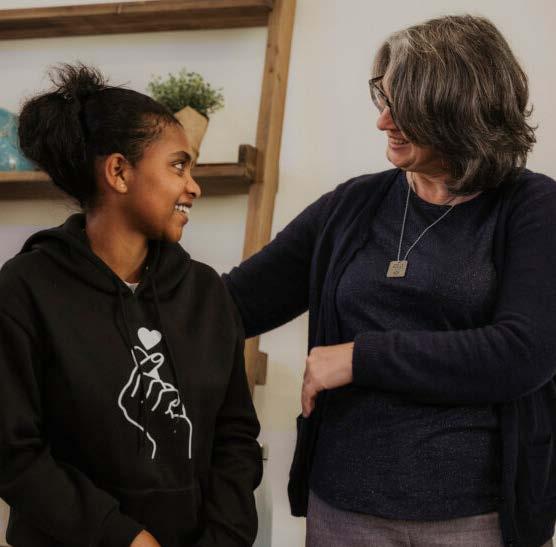


ICEJ HELPING YOUNG ETHIOPIAN JEWISH IMMIGRANTS
AIM HIGH IN ISRAEL
JONATHAN A. PARSONS, ICEJ PUBLICATIONS ASSISTANT
The war ignited by Hamas on October 7 has been shocking and traumatic for everyone in Israel, and even more so for new Ethiopian Jewish immigrants already trying to overcome huge cultural differences and language barriers. This is especially true for the young students among them—ages 18 to 25—who are part of the Jewish Agency’s intensive 9-month high school graduation program, even as they are still adjusting to their new home in Israel. That is why it was so special to see the latest class of 15 Ethiopian Olim (newcomers) graduate from high school at an Aliyah center in Be’er Sheva, thanks to the ICEJ’s sponsorship of this fast-track education program. The moment was extra special, considering the unique challenges the Ethiopian Jewish community must overcome when moving to Israel.
Ethiopian Jewish immigration has been a focal point of the ICEJ’s Aliyah efforts in recent years, with over 3,250 Ethiopian Jews arriving in Israel through ICEJ-funded flights. This accounts for about half of all the Ethiopian immigrants who have come to Israel since their Aliyah process was resumed in 2015.
It is both a dream come true and a life-altering experience for these Ethiopian Olim to make it to the promised land. The transition brings with it many steep challenges due to the language, education, and culture gaps between these newcomers and the rest of Israeli society. Thus, Ethiopian Jews often have difficulty assimilating into the broader Israeli culture, leaving many susceptible to falling into poverty.
That is why the ICEJ not only helps Ethiopian Jews make it to Israel, but we also seek to ensure the younger immigrants who arrive in Israel with at least 8 to 11 years of education have the opportunity to earn a full Israeli high school degree as soon as possible.
The 15 Ethiopian students we met at the Aliyah center in Be’er Sheva not only graduated successfully, but they did so despite facing great
obstacles. With the outbreak of war last October, these students experienced the turmoil of being targeted by Hamas rocket barrages and the overshadowing security threat. Many also had to leave family behind to relocate near other students from different Aliyah centers around the nation. For part of the program, they could not attend classes together and had to switch to learning online.
As the graduation ceremony started, Vered, the program coordinator, addressed the graduates.
“The ICEJ enabled us to help you,” she said. “The teachers and staff were just the mediators, but the ones who made it possible in the first place are the ICEJ. They do so because they believe in you.”
Nicole Yoder, ICEJ Vice President of AID & Aliyah, said, “It’s an honor to be able to help with your Aliyah, but we also want to help you to start building a new life here.” She then told the students, “It is only because of your hard work that you are here today. We gave you the means and tools, but it was you who put in the work to be where you are today. We wish you well and hope that this diploma will be a stepping stone for you to follow your dreams!”
We were especially thrilled to hear that these students are dreaming big! From hi-tech to medicine, dentistry, accounting, and law, each one wants to contribute and succeed. We see it as the ICEJ’s mission to bring the Jewish people back to their historic homeland but also help equip the newcomers with what they need to further themselves and build a new life in Israel, even amid the attempts by Israel’s enemies to destroy this nation.
Your support for our Aliyah efforts will enable the Christian Embassy to help more new Jewish immigrants arrive in their ancestral homeland and establish themselves back among their people.
Give toward our Aliyah and absorption efforts at: www.icejusa.org/aliyah 17 |WORD FROM JERUSALEM ICEJ ALIYAH & ABSORPTION

Your Israel Answer
Pivotal Moments in Jewish-Christian Relations
By Dr. Susan Michael, ICEJ USA Director
Even a casual observer of history cannot help but notice the astounding relationship that has developed between Jews and Christians over the last 80 years. None of this would have happened without the birth of the modern State of Israel in 1948. Since then, however, other pivotal moments have greatly affected and encouraged its growth.
1980 Birth of a Movement
The first was the birth of the International Christian Embassy Jerusalem (ICEJ) in 1980. Christian leaders from several different countries founded this organization to represent the love and support of millions of Biblebased Christians around the world who wanted to bless and assist Israel.
The ICEJ’s mission was to demonstrate that support to the people of Israel through practical assistance and partnership.
This was ground-breaking because for most of the 2,000-year history of Christianity, the relationship between Jews and Christians had been horrible. The New Testament records incidents of Jewish persecution of early Christians, and as the Christian faith grew and became more established, it retaliated and turned against its Jewish roots. Centuries of Christian antisemitism followed, paving the way for the Holocaust.
The ICEJ soon developed a presence in many countries, but the local Jewish communities were not so quick to engage with the Christian Zionist world. They were afraid, and most of the Jewish press reinforced that fear with accusations of hidden motives and agendas. Israeli diplomats tried but often failed to convince Jewish community leaders otherwise.
The Second Intifada
This changed almost overnight during the Second Intifada of 2000. A wave of suicide bus bombings traumatized the people of Israel and halted tourism to the Holy Land as both Jewish and Christian tours were canceled. But then it came time for the ICEJ’s annual Feast of Tabernacles celebration, and thousands of Christians showed up. Some pilgrims went downtown in Jerusalem to ride city buses in solidarity with the beleaguered Israeli people.
When news of this made its way back to the United States, I was invited to speak with leaders and boards of Jewish organizations to explain who evangelical Christians are, what we believe, how many support Israel, and whether the Jewish community should work with us. Several of these organizations made official decisions to launch a Christian outreach to expand their work. Others decided not to do so on a national level but to encourage a relationship at the local level.
By that point, there was a growing number of Christian organizations focused on supporting Israel. One such organization was Christians
United for Israel (CUFI), started by Dr. John Hagee in 2006. Many American Jews were exposed to Christian Zionists for the first time through CUFI events, and the impact was life-changing for them. Since then, a plethora of Christian ministries have formed at the local and national level with the mandate to support Israel, and they are being met by a growing number of Jewish pioneers seeking to work together with them.
October 7, 2024
This brings us to yet another and more recent pivotal moment in the relationship. After the horrific terrorist attack that killed 1,200 Israelis and took another 250 people captive, a wave of support for Israel resounded around the world. Unfortunately, it was quickly followed by angry protests and antisemitic slogans on campuses and in the streets of capital cities on five continents. The American Jewish community was not just scared but shocked to find many of the more liberal movements they had supported now turned against them.
When Christians showed up to stand in solidarity with them at rallies around the world—particularly the one attended by 300,000 people in Washington, DC—there was a collective sigh of relief that Christians really were their friends and were publicly standing with them.In response, leading rabbis representing vast rabbinical networks reached out to link arms with Christian clergy and organizational leaders. Tens of thousands of churches committed to pray in solidarity with synagogues the weekend of November 17–19. Prayers were lifted for Israel and the release of the hostages. Within days some 110 of the captives had returned home.
In January 2024, 70 rabbis, pastors, and Christian and Jewish leaders joined arms for the first time ever to ascend Capitol Hill to meet with Democratic and Republican lawmakers. This historic partnership affirmed to our nation’s political leaders the breadth and depth of American support for Israel, but it also demonstrated something new: a blossoming relationship between Jewish and Christian clergy and a game-changing moment in the history of Jewish-Christian relations. It had moved beyond organizational missions, fundraising, or projects and was now about relationship between the clergy of the two faith communities.
In 1943, amid World War II, 400 Orthodox rabbis traveled to Washington, DC, on behalf of European Jewry. They were alone in their mission to meet with President Franklin D. Roosevelt, who refused to see them. Eighty years later, during Israel’s war with Hamas and a growing tide of antisemitism, Jewish leaders did not go to Washington alone. It is a new day in Jewish-Christian relations.
18 | SEPTEMBER/OCTOBER 2020
Get your questions about Israel answered at: www.israelanswers.com


‘‘Not by might nor by power, but by My Spirit,’’ Says the Lord of hosts.
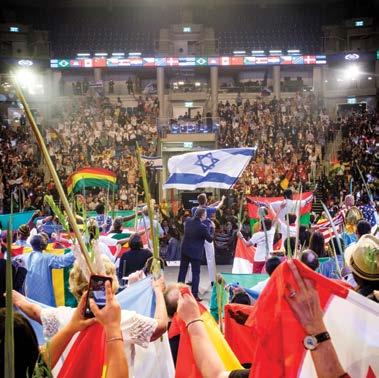
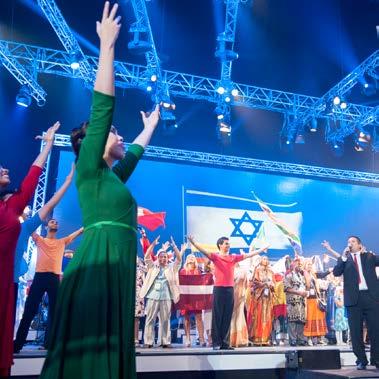
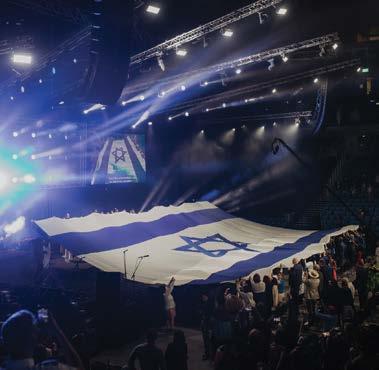

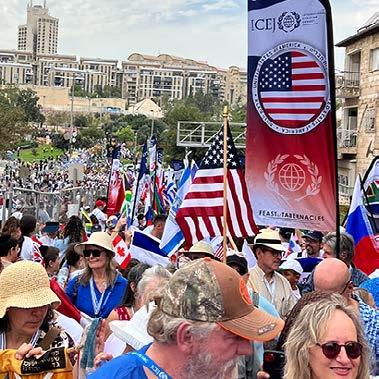
For more information visit: www.icejusa.org/feast-tabernacles
16-23, 2024 SAVE THE DATE
Zechariah 4:6 october














































